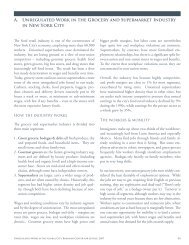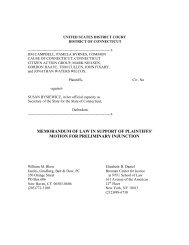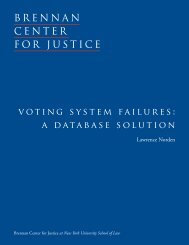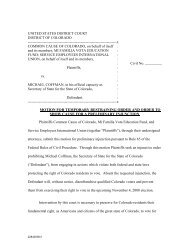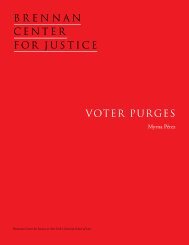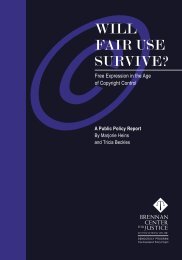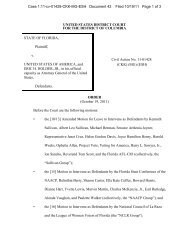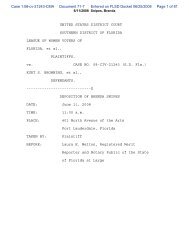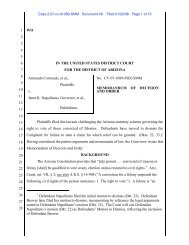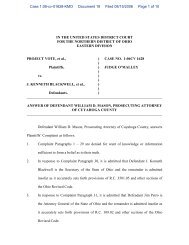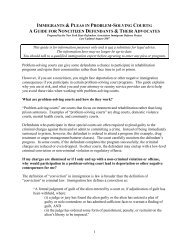Motion to Dismiss - Brennan Center for Justice
Motion to Dismiss - Brennan Center for Justice
Motion to Dismiss - Brennan Center for Justice
You also want an ePaper? Increase the reach of your titles
YUMPU automatically turns print PDFs into web optimized ePapers that Google loves.
12345678910111213141516171819202122232425262728That amendment does not limit the disenfranchisement <strong>to</strong> individuals convicted offelonies at common law. Under Richardson, that provision permits states <strong>to</strong> take awaythe rights of all felons <strong>to</strong> vote. The Richardson court did not distinguish between thetypes of felonies committed by the plaintiffs in that case. Indeed, one of the felonschallenging Cali<strong>for</strong>nia’s disenfranchisement law had been convicted of the “noncommon law felony” of drug possession. 418 U.S. at 32 n.9. Thus, neither the plainlanguage of the Constitution nor the reasoning or language of Richardson supportsPlaintiffs’ argument that the type of felony committed determines whether the felonmay be disenfranchised.Moreover, other courts consistently have upheld felon disenfranchisement lawswithout distinguishing among the particular crimes that gave rise <strong>to</strong> thedisenfranchisement. E.g., Perry v. Beamer, 933 F. Supp. 556, 559-60 (E.D. Va.)(rejecting the notion that the type of felony—common law or non common law—determines whether the state could disenfranchise felons: “The Supreme Court,however, apparently gave no import <strong>to</strong> this distinction, and this Court shall do thesame.”), aff’d, 99 F.3d 1130 (4 th Cir. 1996); Fincher v. Scott, 352 F. Supp. 117, 118(M.D.N.C. 1972) (upholding against an equal protection challenge a North Carolinadisenfranchisement law that excluded all persons convicted “of any crime thepunishment <strong>for</strong> which now or may hereafter be imprisonment in the State’s prison”),aff’d, 411 U.S. 961 (1973); Beacham v. Braterman, 300 F. Supp. 182, 183-84 (S.D.Fla.) (upholding a Florida law that excluded from the franchise all persons convicted“of any felony by any court of record and whose civil rights have not been res<strong>to</strong>red”),aff’d, 396 U.S. 12 (1969); cf. Merritt v. Jones, 533 S.W.2d 497, 500-01 (Ark. 1976)(rejecting felon’s argument that Arkansas constitutional disenfranchisement provisionexcluding persons “convicted of felonies” applied only <strong>to</strong> felonies at common law; theword felonies “is plain and unambiguous” and court would apply its commonmeaning).One federal appellate court upheld against an equal protection challenge a SouthCarolina disenfranchisement law which excluded all persons who had been convictedCase 2:07-cv-01089-SMM Document 22 14 Filed 08/13/2007 Page 14 of 18



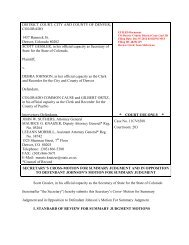
![Download the Letter [PDF] - Brennan Center for Justice](https://img.yumpu.com/50139248/1/190x245/download-the-letter-pdf-brennan-center-for-justice.jpg?quality=85)
